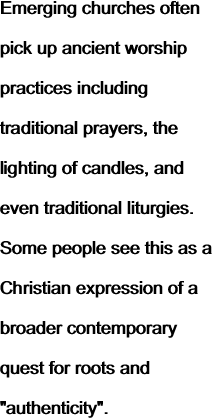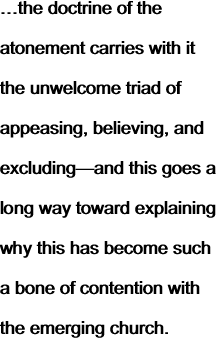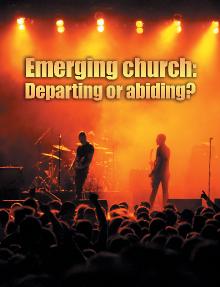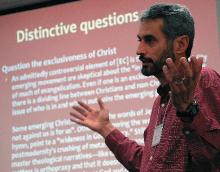 |
|
HOME | PROCLAMATION! MAGAZINE | DEVOTIONALS | STUDIES | LETTERS | ABOUT US | RELATED WEBSITES |
|
HOME / PROCLAMATION! MAGAZINE / 2008 / MAY/JUNE / LANGER
MAY / JUNE 2008
VOLUME 9, ISSUE 3
A R T I C L E S
Emerging church: Departing or abiding?
Rick Langer
The "emerging church" is a name applied to a loosely affiliated movement of churches largely in North America and England. This movement is marked by an intentional desire to reinvent Christianity for the post-modern world—to speak the Gospel in a contemporary idiom. Its advocates have been hailed as heroes launching a new Protestant Reformation. They have also been castigated as a threat to the Gospel and ultimately as dismissing Christianity. What are we to make of this movement? Is the emerging church really just the departing church or is it a novel expression of the abiding church—built on the foundation of the apostles with Christ himself as the cornerstone?
Distinctives of the "emerging church"
Any attempt at exact definition of the emerging church will meet with frustration because there is nothing exact about the emerging church. There is no single organization that constitutes the emerging church—its churches cross all denominational boundaries. There is no bishop, pope, or leader of the emerging church. The emerging church is more likely to write blogs than books. It is more likely to open a coffee shop than convene a church council.
Therefore, it seems more profitable to identify distinctives of the emerging church rather than to attempt a definition. Though these distinctives are not universally true of emerging churches, my intent is to communicate distinctives that are broadly shared and generally descriptive of a significant portion of the emerging church.
Distinctives of style
Young: The emerging church is self-consciously trendy, contemporary, and relevant. It is very concerned to be a church that is looking forward rather than backward. It is pre-occupied with embodying the Gospel in our current cultural moment. One result of this pre-occupation is that the participants in emerging congregations are often very young. The "single and under-30" demographic that is missing in many traditional churches predominates in the emerging church. In fact, many of the leading emerging churches grew out of "Gen X" services at more traditional evangelical churches. These services targeted at "20-somethings" gradually transformed into free-standing congregations.
Non-traditional: The contemporary mindset of the emerging church finds expression not only in its demographic but also in a variety of other tangible manifestations: stage-in-the-center replaces altar-in-the-front, orders of service change radically week-by-week or may be lacking altogether, worship services abounding in media, arts, dance and contemporary culture. Like modern clothing, emerging churches like to have their labels on the outside—they will often say "we do church differently". "Different" is a rallying cry.
Attachment and detachment: The emerging church has a paradoxical inclination to both distance itself and attach itself to previous expressions of Christianity. Specifically, they seek to distance themselves from the evangelical mega-church movement of the preceding generation. They see mega-churches as having been a mile-wide and an inch deep, as having ignored the social needs of our society, and having been marketed and unauthentic. They are also skeptical of traditional "forms" of church more generally: pulpit-centered, Sunday (or Sabbath)-centered; belief-centered; institutionally centered. And most fundamentally, many emerging churches seek to distance themselves from the fairly common evangelical view of the Protestant Reformation as a sort of theological equivalent to V-E Day. Though they may not condemn the Reformation, they often see it as a very mixed blessing if it is seen as a blessing at all.
At the same time, the emerging church does want to attach to the past. They hate things that are 20 years old, but they love things that are 2000 years old. If pressed for a doctrinal statement, they will often appeal to the Apostles' Creed (or Nicene Creed) rather than any contemporary confession. They treasure these ancient creeds as long-enduring statements of consensus among Christians. They can thereby distance themselves from modern theological distinctions which have often caused division and acrimony. Emerging churches often pick up ancient worship practices including traditional prayers, the lighting of candles, and even traditional liturgies. Some people see this as a Christian expression of a broader contemporary quest for roots and "authenticity".
Questioning: Finally, it seems the emerging church often adopts an ethos of questioning. Questioning is seen as a virtue, not a vice. It is partly a sensitivity to post-modern thought in which there are no fixed points. Those who suggest or demand fixed points are culturally out of place and ought to be questioned. But questioning is also part of a quest for personal authenticity—a sort of Christianized version of Socrates' famous claim that the "unexamined life is not worth living." This sentiment is nicely captured by Dan Kimbal, pastor of an emerging church who observes:
But so many churches don't seem to be open to wrestling with anything, predetermining everything from a former systematic theology textbook the pastor of the church used in seminary. What I also found in most conservative evangelical churches is that there wasn't any room to ask questions, and if you did, you would be under suspicion…
But questioning involves a prophetic aspect, not just a personal aspect. Not unlike Old Testament prophets who questioned established practices of Israel and Judah, the emerging church often feels called to question the practices of more traditional churches. As Brian McLaren comments in A Generous Orthodoxy:
Often I don't think Jesus would be caught dead as a Christian, were he physically here today. … Generally, I don't think Christians would like Jesus if he showed up today as he did 2,000 years ago. In fact, I think we'd call him a heretic and plot to kill him, too.
Distinctives of substance
For the emerging church, questioning is not just a matter of style, it is also a matter of substance. Few doubt the merits of questioning styles of worship, but many have grown concerned about the emerging church's tendency to question core doctrines of the Christian faith.
Question the atonement: Modern evangelicalism has tended to assume the centrality of the vicarious atonement understood as Christ being a substitute on our behalf to appease the wrath of God against human sin. This doctrine is commonly (though not universally) questioned by the emerging church. Atonement, for many in the emerging church, is a doctrine that emphasizes belief at the expense of praxis (or practice), which is an emphasis they reject. Atonement is not so much a work of Christ in the past but rather a work of the church in the present. For example, consider the comments of Karen Ward:
We are looking for non-propositional ways of coming to understand the atonement, ways that involve art, ritual, community, etc. ….We have been drawn to lay down theories and enter atonement as the totality of what God did, does, and will do in Christ (life, death, resurrection, and return). We have been beaconed to set aside theories and enter atonement as a happening in God, to God, and through God, and for our sake, breaking open and making possible a new way to live life. We are being moved, as a community, beyond theories about atonement, to enter into atonement itself, or at-one-ment—the new reality and new relationship of oneness with God which Christ incarnated (in life, cross, and resurrection) and into which we are all invited "for all time".
Question the exclusiveness of Christ: Traditional affirmations of the Christian faith have affirmed that Jesus is "the only way to God." This belief is questioned by many in the emerging church. They find such affirmations to be not only excessively narrow but also a reflection of an over-emphasis on belief rather than practice. Scot McKnight summarizes the spectrum of beliefs nicely:
… many in the emerging church movement are skeptical about the "in versus out" mentality of much of evangelicalism…some emerging Christians point to the words of Jesus: "Whoever is not against us is for us" (Mark 9:40). Others, borrowing the words of the old hymn, point to a "wideness in God's mercy." Still others take postmodernity's crushing of metanarratives and extend that to master theological narratives—like Christianity. They say what really matters is orthopraxy and that it doesn't matter which religion one belongs to, as long as one loves God and one's neighbor as one's self. Some even accept Spencer Burke's unbiblical contention in A Heretic's Guide to Eternity (Jossey-Bass, 2006) that all are born "in" and only some "opt out."
Question systematic theology: It is not uncommon for Christians to question one another's theology. What is different in the case of the emerging church is that they are questioning the entire task of theology. Consider this analogy: I am a devoted fan of the Denver Broncos football team, but for the past 10 years, I have questioned the Broncos defense. But this means that I question the quality of the Broncos defense, not the need for the Broncos defense. In fact, my questioning the quality of their defense has been premised upon their need for a defense. Traditionally, when people have questioned one another's theology, they have questioned the quality of each other's theology and assumed the need for it. The emerging church is very different. It is questioning the need for theology. Doctrinal statements and systematic theologies are generally assumed to be by-products of the Enlightenment and responses to modernism which have outlived their usefulness in the context of the post-modern West.
Question truth: The emerging church tends to embrace much of the post-modern critique of truth, feeling that traditional evangelicalism is captive to modernist notions of truth. Doug Pagitt, a pastor of an emerging church congregation and an influential spokesperson for the movement, argues that theology is not about identifying and affirming timeless truths. It should be about story, about conversation, perhaps even about…dance. He relates his church's attempt to address the controversial issue of Pelagianism—a fifth century heresy strongly rejected by Augustine. He wanted people to understand that it was not so much a disagreement about truth but rather people dancing to different songs:
We asked a member of our community, Tim Lyles, to play on his guitar a series of songs, and we asked our people to consider what kind of dance would go with each song. … When Tim played a Spanish tango-style song, our minds moved away from the waltz we were thinking of after his previous selection. When he played an Appalachian tune, our minds conjured yet another image….So it is with cultural worldviews and understandings of theology. For the Irish of Pelagius' land, the dance that went with the song was Celtic spirituality. This meant finding the goodness in creation and organizing the church to live in harmony with the God of the earth. For the Greeks of Augustine's land, the dance was Roman spirituality. This called for an explanation of how one might appease the removed God living in an "elsewhere heaven."
Ultimately, issues traditionally considered matters of truth and orthodoxy are really just matters of style. Theology and truth are reduced to song and dance.
Responding to the emerging church
So how does the emerging church and its questions measure up to Scripture?
First, a few cautions are in order. As I mentioned at the outset of this article, there is tremendous diversity in emerging churches, and the distinctives mentioned above are not found in every emerging church. This is particularly true of doctrine. Doctrinal questions must be answered congregation by congregation. Furthermore, many of the stylistic concerns of the emerging church are legitimate and appropriate. They seek to be contemporary. They hope to speak to the next generation in their native language. Personally, I believe the emerging church should be commended and encouraged in this attempt. As the Reformers themselves said of the church: "Reformatus est semper reformandum" (the church "reformed and always reforming").
But there are matters of substance here that must be addressed. Many in the emerging church contend that contemporary attitudes toward doctrine are a by-product of modernism and the Enlightenment. This cuts across the current of much of traditional evangelicalism which is very concerned with belief and sound doctrine. Specifically, the doctrine of the vicarious atonement offends modern sensibilities on several levels. Claiming that Jesus died to appease the wrath of God against human sin entails a God who judges sin and is provoked to wrath. This vision of God is unwelcome in post-modern culture. Furthermore, if a perfect sacrifice has to be offered to appease God's wrath, it seems difficult to avoid some level of exclusivity. After all, how many perfect sacrifices have been offered? And exclusivity entails a fairly absolute notion of truth, because one cannot exclude without a clearly defined boundary. So the doctrine of the atonement carries with it the unwelcome triad of appeasing, believing, and excluding—and this goes a long way toward explaining why this has become such a bone of contention with the emerging church.
Perhaps the simplest response to these contentions is to study the earliest sermons of the church—those found in the book of Acts and other key passages of the New Testament. Obviously these passages not only pre-date the Enlightenment, but they also contain our most ancient expressions of the Gospel. They are the best place to find the core of the Christian faith once for all delivered to the saints. Let us consider the atonement and several related doctrines in light of these passages.
The Atonement: The book of Acts contains an abundant witness to the apostolic message of the Gospel. Simply put, it is a message of forgiveness of sin through belief in the person and work of Christ. Furthermore, the application of Christ's work is accomplished through a response of repentance and belief; it was not applied generically or universally to all people. Though there is room for debate about exactly how Christ's life, death and resurrection cleanses us from sin, there is no room for debate as to whether or not this was the central message of apostolic preaching. Consider the following passages:
"Repent, and be baptized every one of you in the name of Jesus Christ for the forgiveness of your sins…" (Acts 2:38).
"Repent therefore, and turn again, that your sins may be blotted out…"(Acts 3:19).
"And there is salvation in no one else, for there is no other name under heaven given among men by which we must be saved" (Acts 4:12).
"God…raised Jesus whom you killed by hanging him on a tree. God exalted him at his right hand as Leader and Savior, to give repentance to Israel and forgiveness of sins" (Acts 5:30-31).
"And he commanded us to preach to the people, and to testify…that every one who believes in him receives forgiveness of sins through his name" (Acts 10:42-43).
"Let it be known to you therefore, brethren, that through this man forgiveness of sins is proclaimed to you, and by him every one that believes is freed from everything from which you could not be freed by the law of Moses…" (Acts 13:38, 39).
In all of these passages, hearers are called to repent and believe in order to be saved from their sins. This response is visibly expressed by baptism and then lived out by becoming a member of the Christian community. The pivotal decision was to repent and believe. Good works and community life were expected results of salvation; they were not the means of salvation. It seems the emerging church wants to start with the results and shun the means. In this regard it is good to recall the case of Cornelius. His "prayers and alms ascended as a memorial before God", but as a result, God did not save him but rather sent him Peter so that he might hear the Gospel proclaimed and be saved. His practice was no replacement for believing in the Lord Jesus.
Nature of Truth: Though the apostles clearly called people to "believe in the Lord Jesus", their preaching was also full of stories. Does this mean that they were not as concerned about "truth" as we are? Indeed, the apostles' sermons are constantly recounting the story of Israel culminating in the Messiah who brought salvation to all (see sermons in Acts 2, 3, 7). However, their messages always assume the story they are telling is historically factual. Just like calls by the Psalmists to remember the saving interventions of the Lord, the whole point is that these events really happened. The story is history—events that truly took place. It is not mythology. Truth has no conflict with story—this is just a false dichotomy. Similarly, there is a strong emphasis throughout the book of Acts on the reliability of prophetic Scripture. References to fulfilled prophecy are found in almost every instance of apostolic preaching. There is no question that Scripture, however else it might be used, is used as a source of authority, and statements of both history and prophecy are true in the sense that they correspond with reality. Correspondence with reality is not a modern or an Enlightenment notion. It is a common sense notion. Though these passages are certainly more than mere abstract statements of truths, they are not less than true. And while "true" may mean more than merely corresponding to reality, it does not mean less.
Exclusiveness of Christ: In the book of Acts, it is clear that in proclaiming Jesus, there is an implied or explicit rejection of other religious options. Whether the members of the "synagogue of the Alexandrians" who were refuted by Stephen (Acts 6:9-10), or the religious enthusiasts in Lystra who were rebuked by Paul and Barnabas (Acts 14:15-17), or the religious pluralists of Athens (Acts 17:22), devout religious people are constantly being confronted and called to change their beliefs. They had to repent of their current beliefs and accept the apostolic message. There was no other option. The full range of alternative beliefs were rejected: ignorant idol worship (Athenians), foreign gods which were well-formed and established (Artemus of the Ephesians, Zeus, etc), magic/spiritualism (Simon the magician), Jewish traditionalism (Acts 3 and 4), Jewish converts who were still demanding law-keeping (Acts 15), and believers in the "baptism of John" who had never heard of Jesus. Any and all of these people received the offer of salvation, but always on the terms of their acceptance of Christ as Messiah.
Systematic Theology: It should be noted that systematic theology and creedal statements are not inventions of the modern era or responses to the Enlightenment. They are found in the earliest pages of Scripture and continue to its end. Deuteronomy 6:4 contains a definitional affirmation of the oneness of God—repeated morning and evening by devout Jews to the present day. Old Testament prophets constantly make doctrinal affirmations about the nature of God even as they call God's people to be faithful to their covenant promises. The earliest New Testament documents include creed-like affirmations (1 Corinthians 15:3-7, as well as creedal hymns in Philippians 2: 5-11 and Colossians 1:15-20). The early church convened its first council in Acts 15 to solve a doctrinal issue regarding what is required for salvation. Doctrine is no replacement for practice, but practice is also not a replacement for sound doctrine.
Moral Absolutes: Post-modernism levels all high ground and reduces all boundaries to human convention. Not only are truth claims suspect, but moral claims are suspect as well. It is as inappropriate in the postmodern world to tell someone that they are morally wrong as it is to tell them they are intellectually wrong. The emerging church's desire to speak in a post-modern idiom has left them in a very awkward position when it comes to drawing moral boundaries. This is particularly true of homosexuality since it is such a sensitive cultural issue. Consider Brian McLaren's comments:
Frankly, many of us don't know what we should think about homosexuality. We've heard all sides but no position has yet won our confidence so that we can say "it seems good to the Holy Spirit and us." That alienates us from both the liberals and conservatives who seem to know exactly what we should think. Even if we are convinced that all homosexual behavior is always sinful, we still want to treat gay and lesbian people with more dignity, gentleness, and respect than our colleagues do. If we think that there may actually be a legitimate context for some homosexual relationships, we know that the biblical arguments are nuanced and multilayered, and the pastoral ramifications are staggeringly complex. We aren't sure if or where lines are to be drawn, nor do we know how to enforce with fairness whatever lines are drawn.
Doug Pagitt clearly shares a similar anxiety about speaking out on this issue
The question of humanity is inexorably linked to sexuality and gender. Issues of sexuality can be among the most complex and convoluted we need to deal with. It seems to me that the theology of our history does not deal sufficiently with the issues for our day… I do not mean that we are a more or less sexual culture, but one that knows more about the genetic, social, and cultural issues surrounding sexuality and gender than any previous culture. Christianity will be impotent to lead a conversation on sexuality and gender if we do not boldly integrate our current understanding of humanity with our theology. This will require us to not only draw new conclusions about sexuality, but will force us to consider new ways of being sexual.
Field guide for the Emerging Church
I would like to conclude this article with a sort of field guide for distinguishing between emerging churches which are still abiding churches and those which are actually departing churches.
Signs of a departing church
Some signs that an emerging church is actually departing from the faith include:
Rejection of the vicarious atonement: This can happen at various levels—including levels that may not indicate a church is actually departing from the faith. For example, some emerging churches reject the easy-believism and cheap grace found in some evangelical circles where eagerness to "win souls" pre-empts doctrinal integrity. In effect, a gospel of conversion without discipleship is preached. This superficial "soul-winning" is very disturbing to the emerging church, and some have associated this practice with the doctrine of the vicarious atonement. Therefore, they have distanced themselves from this doctrine in order to distance themselves from cheap grace.
I can understand the desire to reject a doctrine of cheap grace, but one should be very cautious about churches that back away from a simple and clear proclamation that "Jesus died for your sins and that you must believe (and repent) in order to be saved". Statements of this sort characterize the earliest proclamation of the most essential message of the Gospel. Churches that do not proclaim this message are likely to be departing or to have already departed from the faith.
Churches that avoid or reject the language of truth: The New Testament does not back away from the language of truth and neither should we. A church that replaces the language of truth with the language of story is often trying to avoid the inconveniences of mutually exclusive truth claims. At some point the language of truth is an inconvenience that simply has to be accepted or the essential truths of the Gospel will be lost.
Churches that proclaim Christ as OUR Savior but not as THE Savior: There is nothing wrong with stating that Christ is our Savior, but in so saying, one should not be trying to avoid the claim that Christ is the only Savior. This is clearly affirmed by Jesus himself (John 14:6) and elsewhere in the New Testament (1 Timothy 2:4 especially).
Churches that are unwilling to take stands on moral issues: The Gospel has always cut across the moral current of surrounding cultures. This was true of Ancient Near East culture during Old Testament times; it was true of Greco-Roman culture during New Testament times; it is true of American culture during our time. A church must accept this fact and proclaim and practice biblical morality. Moral ambiguity is not a step toward cultural relevance; it is a step toward becoming a departing church.
Signs of an abiding church
Strong use of Scripture: Many emerging churches continue to have strong pulpit ministries which offer sound expositional preaching. This is important in its own right, but it is also an indicator that truth is still important to those who are leading the church.
Willingness to affirm the exclusivity of Christ: Many emerging churches affirm the exclusivity of Christ and the finality of his work on the cross. This should be clearly stated both in any official doctrinal statements (if there are such statements) and also in the preaching from the pulpit. Many churches avoid focusing on the negatives and so avoid explicit statements about cults or other world religions, but they should still be able to affirm that salvation is found only in Christ.
Proclamation of the atoning work of Christ and the necessity of belief: Although there may be conflicts over exactly how Christ accomplished the atonement, there should be no question that he did. There should also be no question that one must believe in him in order to be saved.
Willingness to state clearly their doctrinal beliefs: It is very informative to look at the web pages of emerging churches. Some have clear links to doctrinal statements; some have links to links to more links which eventually reveal a doctrinal statement. Some have no doctrinal statements at all but rather statements of dreams, or visions for community life. A church should be willing to identify clearly the doctrine it is preaching. To go back to my earlier garment metaphor, emerging churches may not wear their doctrinal beliefs as a label on the outside of their clothes, but it should be right behind the collar if you look inside. Be suspicious if you find the doctrinal labels cut off!
In conclusion, I would encourage those who are participating or considering participation in an emerging church to be cautious. There are few places in the contemporary church life where Paul's exhortation to the Thessalonians is more appropriate: "test every teaching, hold fast to what it good". I have found the people in the emerging church to be sincere, their concerns genuine, and their creativity and energy admirable. But their teaching does not always bear scrutiny. Don't torch the teachers, but do test the teachings, and hold fast only to what is good. †
![]()
Copyright 2008 Life Assurance Ministries, Inc., Glendale, Arizona, USA. All rights reserved. Revised September 24, 2008. Contact email: proclamation@gmail.com


 Rick Langer is an Associate Professor in the Biblical Studies and Theology Department at Biola University. Prior to coming to Biola, he served for over twenty years as a pastor at Trinity Evangelical Free Church in Redlands, California. Rick holds an undergraduate degree in chemistry from Colorado State University, and MDiv from Talbot Seminary, and an MA and a PhD in Philosophy from UC Riverside. He and his wife Shari live in Redlands; they have two children: Crystal, 21, and Mark, 19.
Rick Langer is an Associate Professor in the Biblical Studies and Theology Department at Biola University. Prior to coming to Biola, he served for over twenty years as a pastor at Trinity Evangelical Free Church in Redlands, California. Rick holds an undergraduate degree in chemistry from Colorado State University, and MDiv from Talbot Seminary, and an MA and a PhD in Philosophy from UC Riverside. He and his wife Shari live in Redlands; they have two children: Crystal, 21, and Mark, 19.

Rick Langer presented this topic at the last Former Adventist Fellowship weekend held at Trinity Church in Redlands, California. Make your plans now to attend next February.
